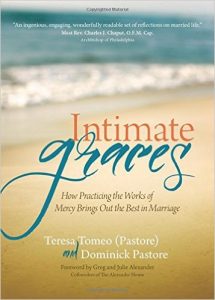Intimate Graces: How Practicing the Works of Mercy Brings Out the Best in Marriage
by Teresa Tomeo and Dominick Pastore
 December 8, 2015 marked the beginning of the Jubilee of Mercy, a year-long celebration of God’s gift of mercy called for by Pope Francis in his Bull of Indiction Misericordiae Vultus. In that document, the Holy Father described mercy as “a wellspring of joy, serenity, and peace” and said, “We need constantly to contemplate the mystery of mercy” (no. 2). The small, accessible book Intimate Graces, by husband and wife Dominick Pastore and Teresa Tomeo, helps married couples do just that: contemplate the mystery of mercy as a wellspring of joy in their own vocation of marriage.
December 8, 2015 marked the beginning of the Jubilee of Mercy, a year-long celebration of God’s gift of mercy called for by Pope Francis in his Bull of Indiction Misericordiae Vultus. In that document, the Holy Father described mercy as “a wellspring of joy, serenity, and peace” and said, “We need constantly to contemplate the mystery of mercy” (no. 2). The small, accessible book Intimate Graces, by husband and wife Dominick Pastore and Teresa Tomeo, helps married couples do just that: contemplate the mystery of mercy as a wellspring of joy in their own vocation of marriage.
Intimate Graces is subtitled How Practicing the Works of Mercy Brings Out the Best in Marriage and thus is centered on the fourteen works of mercy: seven corporal and seven spiritual. Being reminded of these meaningful ways to show God’s love to others was a great benefit of reading this book; how many people recall that “ransoming the captive” and “bearing wrongs patiently” are works of mercy?
In “she said / he said” style, Tomeo and Pastore give their perspectives on the works of mercy as applied to marriage, and share personal stories of how these works have (or have not) been lived out in theirs. Some of their applications are surprising, especially with the corporal works of mercy, which for the most part are not treated literally. For example, they write about “clothing the naked” not as keeping your spouse well-clothed and presentable (an admirable goal!) but as “covering” each other with love and tenderness during vulnerable moments. They also interpret “burying the dead” as helping each other to find healing and to move on from past wounds and regrets. While the more straightforward accomplishments of the corporal works of mercy could have been mentioned, Pastore and Tomeo gave fresh insight into daily ways to show mercy and love to one’s spouse.
A strength of the book is the authors’ vulnerability in sharing the difficulties they’ve faced in their marriage. Without getting bogged down in too much personal detail, their personal witness shows the importance of mercy and gives an example of a couple brought back from the brink of disaster to a healed, flourishing marriage. The topics they address are eminently relevant to couples of all ages today: integrating work and family time, stress caused by financial worries, pornography, technology’s effects on family life, and so on. Any couple could find advice on ways to grow in this book.
Each chapter of Intimate Graces is short enough to read in under ten minutes, with tips for living out that work of mercy, a prayer, and reflection questions at the end. I found the reflections enriching both for myself alone and for a fruitful prayer time with my husband. They would be well suited, too, for a small group of married couples reading the book together.
One thing that could have strengthened the book is the inclusion of a brief history of the works of mercy, to provide context for their place in the Christian life. It also would have been nice if the authors had rotated whose reflection came first so that the tone of the chapter was not always set by the same person. Overall, Intimate Graces is a wonderful book to read during the Jubilee of Mercy and beyond.
About the Reviewer
Bethany Meola is the assistant director of the USCCB Secretariat of Laity, Marriage, Family Life and Youth and the editor of dev19.foryourmarriage.org.
Disclaimer: Book reviews do not imply and are not to be used as official endorsement by the USCCB of the work or those associated with the work. Book reviews are solely intended as a resource regarding publications that might be of interest to For Your Marriage visitors.




